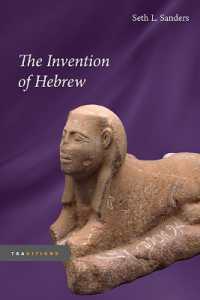- ホーム
- > 洋書
- > 英文書
- > History / World
Full Description
This book offers a new interpretation of the Roman historian Sallust, which places him at the centre of the rich intellectual world of late Republican Rome. Drawing on the evidence of Sallust's digressions in particular, and in contrast to previous views of his work as purely moralistic or unsophisticated, it argues that Sallust uses his historiography to advance a coherent set of ideas about the political chaos he saw around him, and to participate in the broader debates which characterised his period. It also offers a new perspective on the argumentative qualities of classical historiography more widely.
Contents
Acknowledgements
Historiography of Rome and Its Empire Series
Introduction
1 Intellectual Life between Republic and Principate
2 "Among Intellectual Pursuits, by Far the Most Useful": History Reimagined
1 Digression and Historical Argument
1 Approaching Digression
2 Rhetoric and Historiography
3 Defining Historiographical Digression
4 Sallust's Digressions
2 Setting the Scene: Rome and Africa
1 Rome from the Outside: The archaeologia (Bellum Catilinae 6-13)
2 The African Digression (Bellum Jugurthinum 17-19)
3 Politics, Expediency and Thucydides' Theorem
1 The Political Digressions: Bellum Catilinae 36.4-39.5, Bellum Jugurthinum 41-42
2 tanta vis morbi: Thucydides Vindicated (Bellum Catilinae 36.4-39.5)
3 mos partium et factionum: Structuring Crisis in the Bellum Jugurthinum
4 Windows on the Soul: Psychology, Philosophy and Sallust's Portraiture
1 Warped Minds: The Character-Sketches
2 The Ambiguity of Renown
3 Caesar and Cato: The synkrisis
5 Imperial History in the Historiae
1 The corpus
2 Geography and Genre
3 Geographical Knowledge in Sallust's Rome
4 Historical Geography and Historical Argument
Conclusion
Bibliography
Index Locorum
General Index








